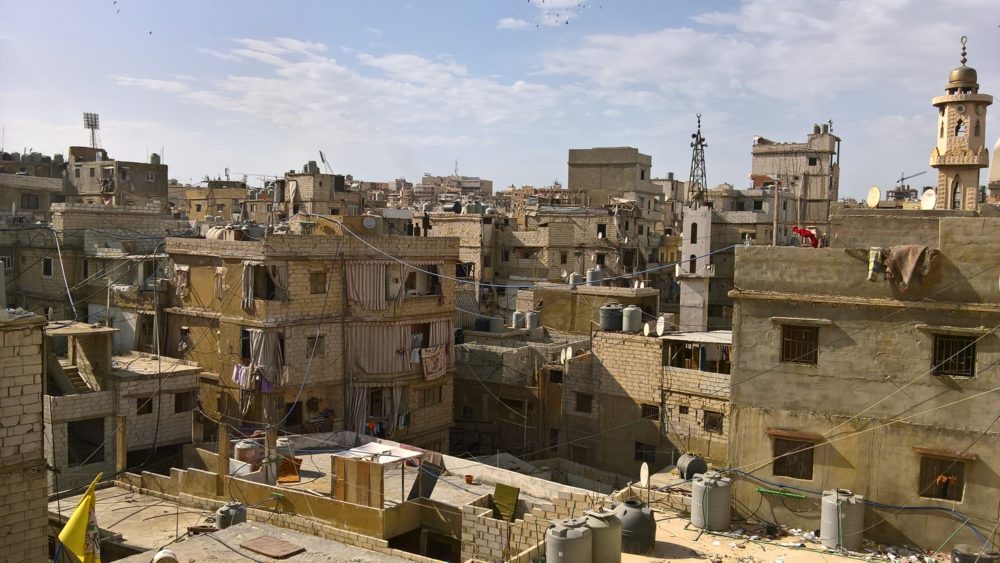IRAP recently concluded its annual student trips to our field office in Beirut, Lebanon, during which students gain hands-on experience working face to face with clients. The students then report back about their experience in their own words. Featured today is a piece written by Stanford Law School student, Meghan Koushik, in which she reflects on the limits of the refugee resettlement process.
Globally, there are fewer than 200,000 resettlement slots available for refugees of all nationalities—a drop in the bucket when compared to the incredible magnitude of the refugee crisis across the Middle East. Recent UN figures suggest five million people have left Syria as refugees, with millions more displaced internally. The small country Lebanon alone hosts at least a million. In an era of increasing political hostility towards refugees, and no end to the Syrian conflict in sight, these numbers are likely to increase.
When we left for Beirut, I was excited to get a glimpse of the process IRAP uses to select its clients. What I wasn’t prepared for was coming face-to-face with the reality that, due to limited resettlement numbers and requirements of resettlement countries, IRAP’s clients comprise a fraction of the many, many desperate people who reach out to them for help. We heard dozens of tragic stories in our week there—children with severe developmental disabilities, traumatized further by growing up in a civil war; husbands who hugged their kids goodbye and went off to work, only to disappear into the Syrian regime’s torture apparatus for months at a time; former millionaires crowding into a single hotel room with their entire family…
Stunningly, despite the immense tragedy that every refugee family has experienced, the vast majority of refugees never qualify for resettlement. Your family in economic distress alone won’t qualify you. Your kids being bullied at a sub-par school won’t qualify you. Going through all the tragedy in the world might not qualify you if you also served in the army, as most Syrian men are required to do. In some sense, the process of intake interviews is not only about determining the most tragic, vulnerable cases, it’s also about identifying the cases demonstrating the particular tragedies that states recognize as acceptable grounds for resettlement. And this process—of telling families who have lost everything, who have suffered so intensely already, that their army service, or their complicated marital history, or something else disqualifies them from resettlement—is excruciating.
This is to say nothing of the people IRAP is able to help, because even being approved for resettlement doesn’t put you on a plane right away. We met with the International Catholic Migration Commission (ICMC), which is a sub-contractor of the State Department and facilitates resettlement logistics. As they told it, in many cases, it takes months—or even years at a time—for people to pass the battery of interviews, security checks, and medical screenings before they are cleared to leave. Quotas imposed by recipient countries frequently means even longer waits before one’s travel is booked. Even for those who have been cleared, the wait continues, as is currently the case for a number of refugees slated to be resettled in the United States.
For decades, America has taken pride in its immigrant heritage. Implicit in the American dream is the idea that no matter where you come from or what you left behind, anyone can come here, start over, and be part of this country. Of course, it’s never been as simple as that. Underneath these platitudes, there’s a long history of exclusion, suspicion, and fear that at various points closed our doors to those requesting entry—from Jews seeking refuge from the Holocaust, to Chinese migrants turned back at ports after the Exclusion Act’s passage. In school, we’re taught that these ugly episodes were aberrations, never to be repeated again. Our world today, however, shows that these narratives of exclusion and fear-mongering persist and frequently define our policies. What often gets left out of the stories we hear in America is what happens to those left behind.
I left Beirut more determined than ever to continue fighting for my clients, to ensure that one day, they’ll step off that plane in Minneapolis or Michigan as the newest American residents. At the same time, I’m now equally committed to finding ways to support refugee communities on the ground in Lebanon and elsewhere. One of the highlights of our trip was visiting local nonprofits working to provide much-needed services to the refugee community in Beirut, from Yalla!, a French-run school catering exclusively to refugee students, to Helem, which provides resources and support for LGBT-identified refugees. In moments where our political system paralyzes resettlement efforts, the Beirut trip was a great reminder of the many incredible people and organizations working every day on the ground to ensure that refugees awaiting resettlement decisions can send their kids to school, get psychological help and medical care, or even just have a community space. In moments where we feel like we’re not doing enough, supporting these efforts can make a huge difference for the thousands of people our broken system is leaving behind.




Comments are closed.